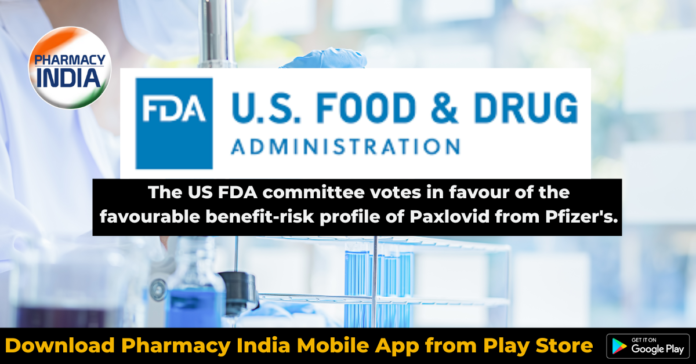According to a report from Pfizer Inc., the Antimicrobial Drugs Advisory Committee (AMDAC) of the US Food and Drug Administration (FDA) voted 16 to 1 in favour of the safety and efficacy of Paxlovid (nirmatrelvir and ritonavir tablets) for the treatment of mild-to-moderate Covid-19 in adult patients who are at a high risk of developing severe illness. The FDA will take into account the AMDAC’s vote even though it is not legally binding when deciding whether to approve Paxlovid.
According to James Rusnak, senior vice president and chief development officer, Internal Medicine, Anti-infectives and Hospital, Pfizer, “We believe it is crucial that adults who are at high risk of progressing to severe Covid-19 have access to safe and effective treatment options, like Paxlovid, to help prevent avoidable hospitalisations and deaths. “The AMDAC’s favourable vote today gives us hope. The results, which demonstrate that Paxlovid helps to lower the risk of hospitalisation or mortality for high-risk adult patients regardless of vaccination status, are well supported by the robust safety and efficacy data shown both in our clinical trials and in a growing body of real-world evidence.
The EPIC (Evaluation of Protease Inhibition for Covid-19) clinical development program’s safety and efficacy findings were among the real-world and scientific evidence that Pfizer shared with the AMDAC in order to inform its decision. Results from the phase 2/3 EPIC-HR study (Evaluation of Protease Inhibition for Covid-19 in High-Risk Patients), which enrolled unvaccinated, out-of-hospital adults 18 years of age and older with confirmed Covid-19 and who are at an increased risk of developing a severe illness, were included in this. According to the findings, patients treated with Paxlovid within 5 days after the onset of symptoms had an 86% lower chance of hospitalisation or death from any cause associated to Covid-19 through Day 28 compared to placebo the phase 2/3 EPIC-SR study (Evaluation of Protease Inhibition for Covid-19 in Standard-Risk Patients), which demonstrated Paxlovid’s efficacy in a subgroup of non-hospitalized adults, 18 years of age and older, with confirmed Covid-19, who had at least one risk factor for progression to severe disease and who were fully immunised.
The clinical profile of Paxlovid in the post-authorization setting is consistent with the safety and efficacy findings from the EPIC clinical programme, as well as observations made when the Omicron variant and its lineages were the predominant forms of SARS-CoV-2 in circulation, according to real-world evidence that was presented to the AMDAC. This practical data demonstrates Paxlovid’s efficacy in treating patients who have received vaccinations and those who have built up natural immunity.
Regardless of virulence, Covid-19 continues to be a severe burden in the US as case rates change and new variations and subvariants appear. As of January 2023, the virus is responsible for 4,000–5,000 hospital admissions and 500–600 fatalities daily in the US. With more than 200 million adults in the US at high risk of severe Covid-19, there is a pressing need for treatment options in this population. 5 The US Centers for Disease Control and Prevention (CDC) list a number of conditions that could increase a person’s risk of developing severe COVID-19, including age 50 or older, obesity, diabetes (both type 1 and type 2), heart issues, smoking (current or former), physical inactivity, chronic kidney or liver disease, and cancer.
Paxlovid might be the first oral medication for Covid-19 to receive FDA approval in the US if it is authorised. The FDA’s preferred Prescription Drug User Fee Act (PDUFA) action date is May 2023. Paxlovid is now approved for treatment in, and is still available to, adults and paediatric patients (12 years of age and older weighing at least 40 kg) at high risk of progression to severe Covid-19 under the FDA emergency use authorization (EUA). Paxlovid has been prescribed for more than 10 million treatment courses in the US to far.
Pfizer expects to submit a supplemental New Drug Application (NDA) to support the FDA’s approval of Paxlovid in children at a later time. Pfizer is still collecting paediatric data from the ongoing clinical trial EPIC-Peds (Evaluation of Protease Inhibition for Covid-19 in Paediatric Patients). Paxlovid received a standard Marketing Authorization (MA) from the European Commission (EC) in February 2023 for the treatment of Covid-19 in adults who do not need supplementary oxygen and who have a higher risk of the condition getting worse.
Paxlovid, also referred to as SARS-CoV-2 3CL protease inhibitor, is a treatment for SARS-CoV-2 main protease (Mpro) infection. It was created to be taken orally so that it may be prescribed right away after an infection, possibly saving patients from developing serious sickness (which can lead to hospitalisation and death). The coronavirus needs the Mpro enzyme to replicate, thus Pfizer’s researchers developed the drug nirmatrelvir to inhibit its function. Nirmatrelvir’s metabolism, or breakdown, is slowed by co-administration with a small dose of ritonavir, allowing it to stay active in the body for extended periods of time at higher concentrations to help fight the virus.
Nirmatrelvir is made to stop viral replication before viral RNA replication, at a stage called proteolysis. Nirmatrelvir’s preclinical research found no evidence of mutagenic DNA interactions. Treatments that act by binding to the spike protein found on the surface of the SARS-CoV-2 virus may not be effective against the current versions of concern. Paxlovid, on the other hand, blocks the reproduction of the SARS-CoV-2 virus by binding to its highly conserved Mpro (3CL protease) inside the cell. The variants Alpha, Beta, Delta, Gamma, Lambda, Mu, and Omicron BA.1, BA.2, BA.2.12.1, BA.4, BA.4.6, BA.5, BF.7, BQ.1.11, BQ.1, and XBB.1.5 have consistently demonstrated in vitro antiviral activity in response to nirmatrelvir. When they become available for testing, work is underway to assess activity against recently found variations.
The typical dosage of paxlovid is 300 mg (two 150 mg tablets) of nirmatrelvir and one 100 mg tablet of ritonavir, given twice daily for five days. Five blister packs of Paxlovid—co-packaged nirmatrelvir and ritonavir tablets—are contained in a single carton, delivering all necessary dosages for a complete five-day treatment course. Nirmatrelvir (one 150 mg tablet) and ritonavir (one 100 mg tablet) should be used combined twice daily for five days if a patient has moderate renal impairment (eGFR =30 to 60 mL/min). Paxlovid is not advised for patients with severe renal impairment (eGFR 30 mL/min).




